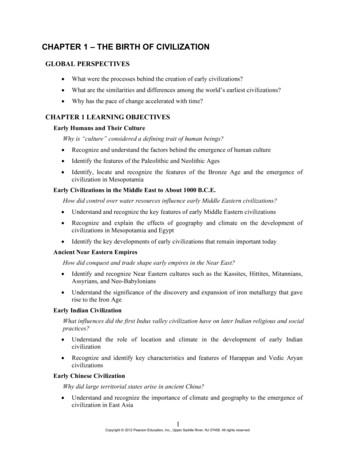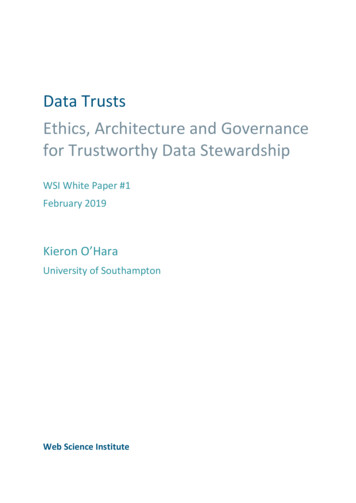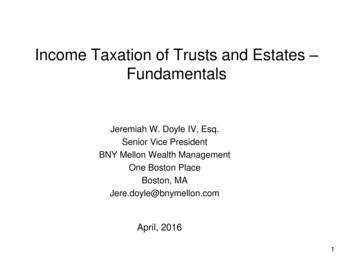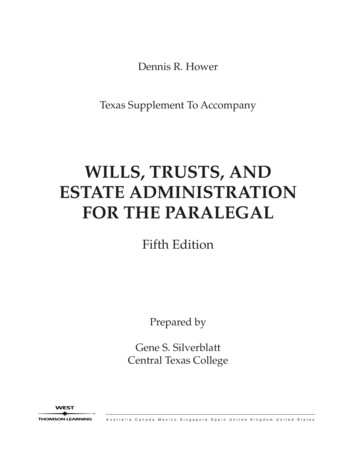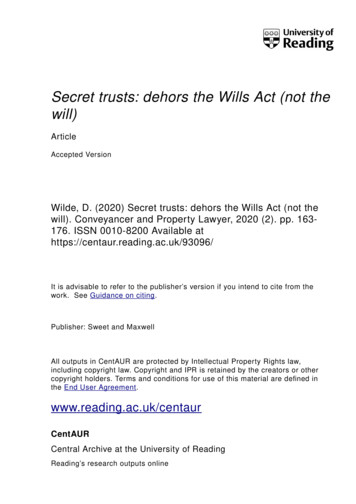
Transcription
PRIMERDynasty Trusts: How theWealthy Shield Trillions fromTaxation OnshoreAn IPS Inequality Briefing PaperKalena Thomhave and Chuck CollinsJune 20211
Authors:Kalena Thomhave is a researcher with the Program on Inequality and the Common Good at theInstitute for Policy Studies.Chuck Collins directs the Program on Inequality and the Common Good at the Institute forPolicy Studies, where he also co-edits Inequality.org. His most recent book is The WealthHoarders: How Billionaires Pay Millions to Hide Trillions from Polity Press, and in 2016 hepublished Born on Third Base: A One Percenter Makes the Case for Tackling Inequality, BringingWealth Home, and Committing to the Common Good.Acknowledgements:The authors would like to thank IPS Associate Fellow Bob Lord for his assistance on this briefand Sophia Paslaski for editorial and layout assistance.The Institute for Policy Studies (www.IPS-dc.org) is a multi-issue research center that hasbeen conducting path-breaking research on inequality for more than 20 years.The IPS Inequality.org website (http://inequality.org/) provides an online portal into allthings related to the income and wealth gaps that so divide us, in the United States andthroughout the world. Subscribe to our weekly newsletter at Inequality.org or follow uson Twitter and Facebook: @inequalityorgThe IPS Program on Inequality and the Common Good was founded in 2006 to drawattention to the growing dangers of concentrated wealth and power, and to advocatepolicies and practices to reverse extreme inequalities in income, wealth, and opportunity.The program has been investigating the intersection of inequality and race, taxation,philanthropy and the problem of hidden wealth.Institute for Policy Studies -National Office1301 Connecticut Ave NW, Suite 600Washington, DC 20036www.ips-dc.org, Twitter: @IPS DCFacebook: nstitute for Policy Studies –New England Office30 Germania Street, Building LJamaica Plain, MA. 02130Email: chuck@ips-dc.org 2021 Institute for Policy Studies2
Key Take Away Points A dynasty trust is a form of trust that is designed to sequester wealth for longer thanordinary trusts — sometimes for centuries or forever. They are often formed in U.S.states that have suspended or altered their state “rule against perpetuities,”legislation that previously limited the lifespan of a trust. The wealth defense industry deploys dynasty trusts to enable ultra-high net worthindividuals — those with 30 million or more — to systematically avoid wealthtransfer taxes – that is, estate, gift, and generation-skipping taxes. Because the super-wealthy are avoiding or reducing their taxes, they are shifting theobligations to pay for society’s investments onto lower and middle-incomehouseholds. Dynasty trusts also entrench existing levels of wealth inequality andfacilitate the formation of dynastic concentrations of hereditary wealth and power. Lawmakers should act at the federal level to shut down or discourage the formationof dynasty trusts for the purposes of tax avoidance and dynastic succession. Actionscould include the passage of a federal “rule against perpetuities,” banning certaintrust arrangements, and taxing income and wealth in trusts.IntroductionDynasty trusts are used routinely in estate planning by millions of Americans of modestwealth. But they also serve as a vital tool in the systematic tax avoidance of trillions ofprivate wealth, helping to entrench inequality and bolster the development of multigenerational wealth dynasties.In a healthy democratic society, with an effective and progressive tax system, greatfortunes dissipate over a few generations. Significant wealth may accumulate, but itdisperses down the family line as more heirs come on the scene. If a wealthy family pays itsfair share of annual income taxes and estate or inheritance taxes, as well as takesadvantage of tax incentives for charitable giving, these fortunes do not accelerate butdiminish. The natural order in such societies is to prevent dynastic wealth formations.In the U.S., however, we are witnessing a massive reassertion of dynastic wealth.One can assume, though it is difficult to trace in every case, that some families havearrested this process of wealth dispersal through aggressive tax avoidance.American tax law currently encourages the perpetuation and accumulation of trust-heldwealth, where assets are out of reach of taxation and family wealth can privately grow,aided by laws promising opacity and secrecy. The United States — besting Switzerland —is now the world’s Number 2 secrecy jurisdiction according to the Tax Justice Network’sFinancial Secrecy Index, which ranks tax havens.1 The honor is thanks to a patchwork ofU.S. states competing in recent decades to lower their standards to attract the investment3
capital of the world’s ultra high-net worth individuals — those with more than 30 million.Only the Cayman Islands shelters more wealth than the U.S.The sheer size of what social scientist Jeffrey Winters calls the “Wealth Defense Industry”— the tax attorneys, accountants, wealth managers, and family offices deployed to help therichest 0.1 percent — reflects a staggering amount of professional fire power devoted tomaking the wealthiest people on the planet appear to own considerably less wealth thanthey do.2The number of family offices, formed with the mission of growing and sequestering familywealth — and facilitating the creation of inherited wealth dynasties — has mushroomedfrom fewer than 1,000 in 1980 to an estimated 10,000 today.3Wealth advisors are paid millions to hide trillions with their sophisticated networks ofoffshore bank accounts, anonymous shell companies, and dynasty trusts.These activities sustain and protect dynastic wealth, giving rise to the powerful familieswhose wealth has made them household names.A century ago, Frank Mars created a popular candy bar. His son, Forrest Mars, Sr., took overhis candy company and grew it into an empire. In 1983, Forrest Mars was worth 2.7billion in today’s dollars. The Mars family has used its wealth and power to abolish theestate tax in Virginia — and attempt to repeal it at the national level. At the end of 2020, theMars family was worth an estimated 94 billion.4Sam Walton founded Wal-Mart and in 1983 was worth nearly 6 billion in today’s dollars.The Waltons have lobbied to abolish the estate tax and protect their company’s monopolypower. Audrey Walton even went to tax court to defend her use of tax loopholes; hersuccess resulted in a trust named after the family.5 According to Forbes, the Walton familyis worth over 247 billion.6In 1878, E.W. Scripps founded his first newspaper company, eventually creating anationwide chain of daily papers. The heirs of the Scripps media empire are worth anestimated 8.4 billion.7 Some in the Scripps family are regular philanthropists, though thefamily has its own Nevada-based private trust company: Miramar Fiduciary Corporation isnamed after what E.W. called the house he built on his ranch in California.8Instead of wealth dispersing over generations, it is accelerating and concentrating. As thenumber of billionaires increases, from 15 in 1983 to over 700 today, we should beconcerned about how dynastic wealth is growing.9Unless the U.S. can reverse this trajectory, we’re on track to become a hereditaryaristocracy of wealth, as the French economist Thomas Piketty has warned, where onegeneration from now, the sons and daughters of today’s billionaires will dominate oureconomy, politics, philanthropy, and culture.10 The domination of today’s billionaires isalready corrosive, but it can get even worse.4
As wealth and power concentrates, the cycle continues. The wealthy exert their power tofurther shape the rules, news, and culture of society. They block popular reforms bycapturing the political system, fend off enforcement, and ensure dysfunctional gridlock.This leads to further consolidation of wealth dynasties, impervious to taxation andaccountability. It also leads to further social breakdown and polarization, as our collectivecapacity to solve big problems — like responding to a pandemic or ecological disruption —is rendered inoperative.Even in a country that was forged out of a rejection of feudalism, it may be hard for those ofus in the U.S. to spot the telltale signs of a reassertion of feudalistic and monarchic norms.One component is what law professor Allison Tait describes as a culture of “high wealthexceptionalism,” where the wealthy believe they are entitled to a separate set of laws andrules governing them because of their wealth — and the rest of society tolerates thisarrangement.11As this brief primer will explain, we can fix this. Lawmakers could shut down this hiddenwealth apparatus overnight by outlawing particular trusts and loopholes, promotingownership transparency, passing global trade treaties that prohibit offshore practices (andconsign rebel states to economic pariah status), and investing in robust enforcement.The “dynasty trust” is a trust designed to drive dynastic wealth accumulation. This primeris devoted to understanding this key tool in the wealth-sequestering toolbox.What is a dynasty trust?Trusts are one way that America’s wealthy families protect their money. The Rockefellers,the Hearsts, the Du Ponts — these families tucked their wealth into trusts to pass it downthrough generations. Trusts are legal relationships between grantors, creators of the trusts,and trustees, who hold, manage, and administer trust assets on behalf of the trust’sbeneficiaries.A dynasty trust is a particularly powerful type of trust; it shelters wealth from transfertaxation for the long term — possibly forever. Generally, trust assets diminish and areconsumed within a few decades. But when massive wealth is placed into dynasty trusts, itcan accumulate in a manner that far outstrips the needs of beneficiaries. Although dynastytrusts have been with us for a long time, there has been a sharp uptick in dynasty trustformations over the past several decades. Like the name suggests, dynasty trusts facilitatethe creation of multi-generational, modern-day wealth dynasties.What’s fueled the explosion in dynasty trust formations?As a rule, transfer taxes — estate taxes, gift taxes, and generation-skipping transfer taxes —are meant to prevent dynastic wealth from exponentially accumulating as it is passed fromgeneration to generation. Establishing a dynasty trust allows grantors to allocate the 11.75
million generation-skipping transfer tax exemption ( 23.4 million for married couples)to assets transferred to the trust, while moving these assets out of the taxable estate.12 If adynasty trust is carefully designed, these assets — which will almost certainly continue togrow — can move to the next generation, and to the next generation after that, all withoutbeing subject to transfer taxation. Because income taxes are still due on any revenuegenerated by the assets, those setting up dynasty trusts often do so in states withoutincome taxes, or they place assets that don’t produce income in the trust, such as growthstocks or life insurance policies.As a result, the wealth that dynastic families have accrued over the years is out of reach.After 300 years, an initial 1 million investment in a dynasty trust, growing at a 6 percentafter-tax rate, would be worth approximately 39 trillion, a little under half of the world’scurrent GDP. It’s hard to conceptualize what this absurd number would even mean 300years from now, but this is how the industry markets itself to would-be wealth hiders.13 It’salso a good illustration of how dynasty trusts, whether lasting for 100 years or forever, willaccelerate the widening of the chasm between the poor and the extremely rich.Take the Mars family: according to reporting by Forbes and the Bloomberg BillionairesIndex, the Mars family has apparently been able to avoid estate taxation for generations.Jacqueline Mars and John Mars, the two surviving children of Forrest Mars, Sr., are eachworth 31.3 billion.14 Their brother Forrest Mars, Jr. died in 2016, and today his fourdaughters have 7.8 billion each — for a total of 31.2 billion.15 That’s not a coincidence.What probably happened was that before 1986, the year the generation-skipping tax wasinstituted, Forrest Mars, Sr. transferred his wealth into a trust divided into three equalshares — one share for Jacqueline, one for John, and one for Forrest, Jr. Then, when Forrest,Sr. died in 1999, his estate didn’t include the wealth in the trust, and it was passed tax-freeto his children. The trust Forrest, Sr., established for Forrest, Jr., likely provided that uponthe death of Forrest, Jr., it would be split automatically into equal trusts for the children ofForrest, Jr., thus causing it not to be included in Forrest, Jr.’s estate. If that trust wasestablished before 1986, the generation-skipping tax would not apply as a result of ForrestJr.’s death.The Rule Against PerpetuitiesState rules differ on the legal lifespans of dynasty trusts, with some states more attractivethan others — which is why the ultra-wealthy are setting up trusts in states like SouthDakota, Nevada, Wyoming, and Delaware. The use of dynasty trusts in these states haveclimbed because of the repeal or weakening of the “rule against perpetuities” over the pastfew decades.The rule against perpetuities is hundreds of years old, having arisen out of England’s feudalpast as a way to limit the wealthy from exerting power over property from the grave. Backthen, landowners would tie up their estates in trusts that would continue after their deaths,allowing their descendants to enjoy the benefits of an estate they did not outright own. Therule against perpetuities thus ensured that trusts were vested after a certain period of time6
— generally 21 years after the last beneficiary alive when the trust was created dies —instead of lasting for perpetuity. The rule was a response to dynastic wealth, a way to curbits influence and ensure that assets wouldn't be bound in a trust for generations, but wouldreturn to the economy.Fast forward to the modern day, and a number of states aiming to attract trust businesshave passed legislation that permits trusts to last centuries. More than half of states haveeliminated or severely curbed the U.S. version of the rule against perpetuities, eitherallowing trusts to remain intact for hundreds of years, or in the case of some states,forever.16 In addition to the long lifespans of trusts, states have also attracted the assets ofthe wealthy (without having to personally relocate) — and appeased wealth industrylobbyists — by abolishing income tax and promising to seal trust records.These states have created environments ripe for dynastic wealth to thrive.State Legislatures Have Been Captured by the Wealth Defense IndustrySouth Dakota is the country’s leader in dynasty trusts and wealth protection. The state wasone of the first to repeal the rule against perpetuities and has no income tax, no inheritancetax, and no capital gains tax. It also protects assets in trusts from divorce, creditors, andchild support claims. South Dakota has a population of fewer than one million, but there isno need to be a resident of a state to set up a dynasty trust there. As evidence of a boomingindustry, there are more than 100 trust companies operating in the state, managing adisclosed 367 billion in assets.17 But there’s probably much more in assets than what isdisclosed; in 1997, Governor Bill Janklow set up a trust task force, now made up largely ofwealth industry professionals “with the goal of establishing and maintaining SouthDakota's stature as the premier trust jurisdiction in the United States,” as stated on theSouth Dakota Division of Banking’s website.18 That means finding new ways to attractwealth hiders, creating a few hundred jobs in return for managing the billions of theworld’s richest 0.1 percent.More states continue to rewrite their trust laws, joining the majority that have broken thefloodgates to let dynastic wealth flow across their borders. Indeed, given that a majority ofstates have weakened or eliminated the rule against perpetuities, states may feel pressureto adopt similar, wealth industry-friendly legislation to remain competitive. In 2019,Connecticut passed legislation allowing trusts to last up to 800 years. A representativefrom the Connecticut Bar Association, arguing in favor of the new law, said:Trust assets are leaving states like Connecticut because of our antiquated trust lawsand are migrating into New Hampshire and other modern trust jurisdictions. Thisexodus materially and adversely impacts Connecticut’s financial services industryand, consequently, Connecticut’s economy as a whole.19The Estates and Probate Section of the Connecticut Bar Association drafted the legislation,with help from the Connecticut Bankers Association.207
Lawmakers often defer to industry experts because of the complexities of trust laws. Inpractice, this means the financial services industry effectively captures small statelegislatures to advance practices that will encourage wealth dynasties in the U.S. and evenfacilitate global wealth hiding.The map below shows which states have abolished or weakened the rule againstperpetuities (RAP). The states highlighted in black are some of the most notorious onshoretax havens, popular not only for the abolition or weakening of the RAP but for other lawsthat don’t levy income tax on trusts or that protect assets from creditors. They are SouthDakota, Nevada, Delaware, Alaska, Tennessee, Wyoming, Rhode Island, Ohio, NewHampshire, Illinois, Florida, and Missouri.21However, as one trust and estate attorney explained:The problem with some states abolishing the RAP is that large sums of wealth nowcan concentrate indefinitely, exacerbating an already horrific wealth inequalitysituation. Truth is, however, the RAP itself was too lenient on this front. It allowed atrust to last for a century or more. That may be better than 500 years, but notmuch.22Even in states with the rule against perpetuities intact, trusts that can last for 100 years ormore can still facilitate wealth dynasties. If a trust can last 100 years, it could be another70 years or so until the wealth in that trust is subject to a transfer tax.American AristocracyIt’s difficult to know exactly which families are utilizing dynasty trusts because of thesecretive nature of wealth planning. We can get glimpses of who has benefited fromdynasty trusts when financial disputes are inevitably taken to court. But South Dakota, thenumber one state for wealth hiding, seals its records from the public eye.8
We know a few names of families benefiting from dynasty trusts: the Chicago Pritzkers(Hyatt Hotels), the Minnesota Carlsons (Radisson Hotels), the Wrigleys (heirs of chewinggum magnate William Wrigley), and the Scripps family.23 Steven Mnuchin placed 32.9million worth of corporate stock, art, and a jet in his dynasty trust, disclosed to federalethics officials.24 Jeff Bezos’s mother, Jacklyn Bezos, has a generation-skipping trust, whichwe know because of Amazon SEC filings from the 1990s.25Additionally, a number of wealthy families have chartered their own private trustcompanies in South Dakota: for example, the Cargill-MacMillans (the Cargill agriculturecorporation) and the Dillons (heirs of investor Clarence Dillon).26When asked about their estate planning, wealthy families unsurprisingly are tight lipped.“We are a very public family with a very private investment philosophy,” said ChristopherKennedy, whose family is worth approximately 1 billion.27 Of course, that’s peanutscompared to families like the Waltons (net worth: 247 billion), whose familyspokesperson assured Bloomberg in 2013 that “[A]ny charitable or estate planningpractices employed by the Walton family are broadly available and commonly used.”28Given that dynasty trusts are becoming so popular, and so easy for American billionairesand multimillionaires to create, perhaps a better question is: How many ultra-rich familieshaven’t made one? In all likelihood, very few.Why should we care?There are three primary reasons we should be concerned about the role of dynasty trustsin a larger hidden wealth system. First, they enable wealthy individuals from around theworld to move their money to the U.S. to escape accountability. There is growing evidencethat the U.S. has become a premiere destination for kleptocratic capital. Wealthyindividuals are plundering the wealth of their home nations, especially hurting the world’smost poor and vulnerable populations. Hidden wealth systems, including dynasty trusts,empower criminals, deadbeats, and kleptocrats, allowing them to thrive in secrecy.Secondly, when wealthy individuals use dynasty trusts to dodge and evade their taxresponsibilities, they shift obligations onto those with fewer resources. Dynastic trustsundermine how self-governing societies organize meaningful tax systems, raise revenue,and make public investments. The tax dodges and shifts that undermine public finance anddemocratic decision-making — some of which are considered “legal” — are a huge cost tosocieties. When the wealthy don’t pay, they leave the bills to everyone else for publicservices, ranging from caring for veterans and protecting national parks to buildinginfrastructure and protecting the public from infectious diseases.When the wealthy form dynasty trusts to reduce or eliminate transfer taxes, they create atwo-tier tax system — one set of rules for themselves, another for everyone else. As aresult, we end up with absurd situations where a senior government official says, “onlymorons pay the estate tax,” acknowledging that the U.S. estate tax system is optional for thewealthiest.299
Finally, dynasty trusts contribute to the rapid growth of income and wealth inequality,fortifying oligarchic concentrations of dynastic wealth and power that lead to an erosion ineconomic opportunity and social mobility — and ultimately threatens self-governingdemocracies.When professionals in the Wealth Defense Industry lodge enormous wealth in a dynastytrust, they are working as agents of inequality. By helping the rich avoid theirresponsibilities to the communities and nations from which they draw their wealth, theyaccelerate our movement toward a future of grotesque division and social disruption. Theywill claim they are helping their clients obey the laws. But, while the left hand is usingvarious wealth-hiding techniques and loopholes, the right hand is fending off oversight,lobbying for special privileges, and creating new loophole innovations.What should we do?Any effort to require the wealthy to pay their fair share must end the pernicious use ofdynasty trusts and shut down this global wealth hiding system.With political leadership, this could be fixed easily by increased enforcement and theelimination of tax avoidance strategies that drive trust formation and perpetuation. TheU.S. should join other nations in boosting transparency and information sharing to shutdown illicit money flows.The first step to reform is getting past our cultural tolerance for “billionaireexceptionalism.” The second is to recognize that the wealth defense industry thrives oncomplexity and opaqueness and to press lawmakers for transparency and simplicityinstead.Congress made an important first step in December 2020 with the bipartisan passage of theCorporate Transparency Act, legislation requiring corporations to disclose their beneficialowners to an arm of the Treasury Department. Pressure from around the country ledDelaware’s secretary of state to finally end the state’s opposition to such legislation.30Unfortunately, trusts and partnerships are exempt from the law, creating a glaring loopholethe Wealth Defense Industry will exploit. This will only increase the prevalence of dynastytrusts.What follows are a set of legislative and administrative fixes, slightly overlapping in somecases, to discourage the build-up in dynastic wealth and to specifically to constrain dynastytrusts.Federal Rule Against Perpetuities. To close down dynasty trusts, William and Mary LawSchool professor Eric Kades calls for a federal rule to limit the lifespan of trusts, what hecalls the National Anti-Feudalism Act. A federal restoration of the “Rule AgainstPerpetuities” would undercut the race between states in watering down their standards. It10
would create a limited lifespan for trusts. Trusts would not disappear, but the ability tosequester wealth for centuries would be curtailed.Outlawing Certain Types of Trusts. Lawmakers must plug loopholes that use trusts as taxavoidance vehicles. Senator Bernie Sanders’ estate tax reform legislation would be a hugestep in the right direction.One wealth advisor, Martin Shenkman, sounded the alarm in Forbes when Sanders firstsuggested these provisions in 2019. “Whoever helped craft those proposals understoodmany of the tax planning strategies the uber-wealthy use to shift assets outside theirtrusts,” Shenkman complained.“Bernie’s changes include restrictions on the use of valuation discounts, GRATs, and morethat have been the grease for many estate plans,” wrote Shenkman. Sanders’s provisions“would emasculate this type of planning and might result in a costly tax after fifty years of atrust.” Shenkman advised his clients to go out and create new dynasty trusts before aSanders law could take effect.31One provision of Sanders estate tax bill would end tax breaks for dynasty trusts and othersophisticated wealth hiding provisions. The Sanders bill would: Strengthen the “generation-skipping tax,” which is designed to prevent avoidance ofestate and gift taxes, by applying it with no exclusion to any trust set up to last morethan 50 years. Prevent abuses of grantor retained annuity trusts (GRATs) by barring donors fromtaking assets back from these trusts just a couple of years after establishing them toavoid gift taxes (while earnings on the assets are left to heirs tax-free). The lawyerwho invented this technique for the Waltons claims it has cost the Treasury 100billion since 2000.32 This is a grotesque understatement. Prevent wealthy families from avoiding gifts taxes by paying income taxes onearnings generated by assets in “grantor trusts.” Sharply limit the annual exclusion from the gift tax (which was meant to shield thenormal giving done around holidays and birthdays from tax and recordkeepingrequirements) for gifts made to trusts.The Sanders bill would also close other common loopholes used by estate planners called“valuation discounts,” restrictions placed on interests in family businesses that are claimed,falsely, to reduce the value of the estate. Another loophole game involves claiming that thevalue of an inherited asset is lower, for estate tax purposes, than what is claimed forincome tax purposes to calculate gains when the asset is sold.33Establishment of Inheritance Tax on Heirs. Shifting from an estate tax to an inheritancetax would capture and tax wealth when it enters dynasty trusts and when it flows torecipient heirs. A targeted and progressive inheritance tax would not eliminate dynastytrusts, but it would limit dynastic flows to next generations.11
Oversight and Enforcement. The oversight role of the Internal Revenue Service has beendecimated over the last few decades, particularly in their ability to monitor complex trustsand tax loopholes. Rep. Ro Khanna has introduced the Stop Corporations and HigherEarners from Avoiding Taxes and Enforce Rules Strictly (CHEATERS) Act, legislation tostrengthen enforcement of tax rules and crack down on tax dodging by the wealthy.34President Biden has also proposed a substantive investment in tax enforcement, spending 80 billion over the next decade to rebuild the IRS’s capacity to oversee the taxmachinations of the very wealthy.35Administrative Actions. If Congress fails to act, the executive branch should dust offregulations first proposed in 2015 to address valuation discounts, which reduce the valueof a transferred asset for tax purposes, as well as take additional action available to it tolimit the use of trusts that are ripe for abuse, such as intentionally defective grantor trusts(IDGTs) and GRATs.36Constrain Dynasty Trusts. Here is a four-part program to arrest and ultimately reversethe explosion in dynastic wealth.1. Close Loopholes. Enact the reform measures described above to close the gapingloopholes in the estate, gift and generation-skipping tax system. With those reformmeasures in place, dynastic wealth accumulations will be reduced substantially withthe passing of each generation.2. End Step Up in Basis. Replace the rules that currently eliminate the unrealizedgain on appreciated assets at death with rules that require tax to be paid on thatgain at the time the assets are passed at death or by gift. This will end the avoidanceof income tax by the ultra-rich on massive amounts of gains. It will tax those whohold appreciated assets until death effectively the same as those who sellappreciated assets during their lifetimes. Legislation that would implement thischange has been proposed by Senator Chris Van Hollen. (See the SensibleTaxation and Equity Promotion (STEP) Act).373. Tax Income in Trusts at Higher Rates. Add an additional income tax bracket fortrusts, five percentage points higher than the maximum income tax bracket forindividuals, on undistributed trust income in excess of 500,000. This willencourage the distribution of trust income to individual beneficiaries in order toreduce the applicable income tax rate but will not penalize reasonableaccumulations of trust income to provide for the future needs of trust beneficiaries,including young and disabled beneficiaries. The distribution of income from dynastytrusts will slow the accumulation of dynastic wealth.4. Wealth Tax o
2 Authors: Kalena Thomhave is a researcher with the Program on Inequality and the Common Good at the Institute for Policy Studies. Chuck Collins directs the Program on Inequality and the Common Good at the Institute for Policy Studies, where he also co-edits Inequality.org. His most recent book is The Wealth Hoarders: How Billionaires Pay Millions to Hide Trillions from Polity Press, and in .


